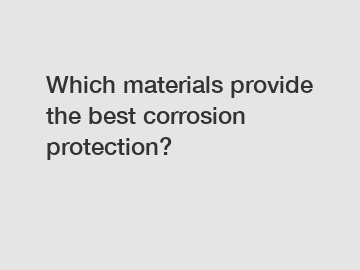Which materials provide the best corrosion protection?
Which Materials Provide the Best Corrosion Protection?
Corrosion is a natural process that can greatly affect the durability and lifespan of various materials. It occurs when metals and other materials react with their environment, leading to the deterioration of the material and potentially causing significant damage. Corrosion can be highly detrimental to structures and objects exposed to harsh conditions, such as those in marine environments or industrial settings. Therefore, choosing the right materials that provide effective corrosion protection is crucial for ensuring long-term durability and sustainability. In this article, we will explore some of the best options available for corrosion protection and highlight their advantages.
Coatings and Paints.

One of the most common methods used for corrosion protection is the application of coatings and paints. These protective layers create a barrier between the metal and the surrounding environment, preventing direct contact and minimizing the risk of corrosion. Coatings can be applied on various materials, including steel, concrete, and even plastics. They are available in a wide range of types, such as epoxy, polyurethane, and zinc-rich coatings. Each coating type offers specific advantages, such as enhanced durability, chemical resistance, or high-temperature stability.
H2: Cathodic Protection.
Cathodic protection is an electrochemical method widely used to prevent corrosion in pipelines, tanks, and offshore structures. This technique relies on using a sacrificial anode or impressed current to counteract the electrochemical reaction responsible for corrosion. Sacrificial anodes, typically made of zinc, aluminum, or magnesium, are intentionally placed on the surface of the metal to be protected. These anodes corrode instead of the metal, sacrificing themselves to protect the structure. Impressed current cathodic protection, on the other hand, involves the use of an external power source to generate an electric current that counteracts the corrosion process.
H2: Stainless Steel.
Stainless steel is known for its exceptional corrosion resistance, making it a popular choice in industries where exposure to harsh environments is common. It is an alloy that contains a minimum of 10.5% chromium, which forms a protective layer of chromium oxide on the surface when exposed to oxygen. This passive layer acts as a shield, preventing further oxidation and corrosion of the underlying metal. Stainless steel is resistant to various forms of corrosion, including general, pitting, and crevice corrosion.
H2: Polymers and Plastics.
Polymers and plastics are increasingly being used as corrosion-resistant materials. They offer several advantages, such as lightweight, high strength, and excellent resistance to chemicals, moisture, and UV radiation. In addition, they do not require coatings or paint for protection, reducing maintenance costs. Polymers and plastics can be fabricated into various forms, including pipes, tanks, coatings, and linings, making them suitable for a wide range of applications.
Closing:
Choosing the right materials for corrosion protection is essential for the longevity and durability of structures and products. Coatings and paints, cathodic protection, stainless steel, and polymers/plastics are among the most effective options available. Each material offers specific advantages and should be selected based on the requirements and environmental conditions of the application.
If you have any further questions or need assistance in choosing the right corrosion protection materials, please do not hesitate to contact us.
Are you interested in learning more about pipe wrapping tape manufacturers, Visco-elastic Pipeline Wrap Tape, anti corrosion pipe wrapping tape? Contact us today to secure an expert consultation!
147
0
0


Comments
All Comments (0)